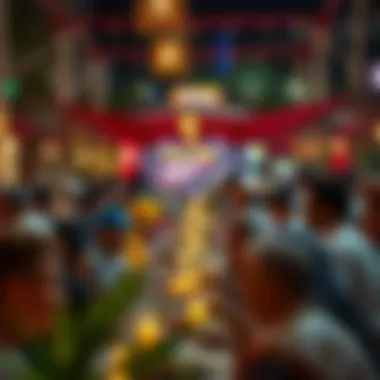Understanding Iftar Times in 2023: A Complete Guide


Intro
As the sun dips below the horizon, a profound sense of anticipation envelops countless individuals participating in Ramadan across the globe. This sacred month not only signifies a time for reflection and spiritual growth but also highlights the significance of iftar—the traditional meal breaking the fast. However, understanding when this poignant moment occurs can be quite intricate due to its dependency on geographical location, time variation, and other significant factors. Throughout this exploration, we intend to dive into the elements shaping iftar times in 2023, examining how these factors intertwine with daily life, particularly within vibrant settings like Dubai.
With each sunset during Ramadan, communities gather to share meals, leading to a festive atmosphere filled with camaraderie and cultural richness. Timing becomes more than just a clock tick; it becomes intertwined with religious obligations, meal preparation, and, importantly, the gathering of families and friends. It's essential, therefore, to grasp the nuances behind how iftar times are calculated, especially in regions subject to rapid changes in daylight.
In this guide, we will outline the different variables affecting iftar timing, providing context to the cultural practices on display. Additionally, local influences in cities such as Dubai play a pivotal role in shaping how residents approach this month, transforming personal routines and community interactions. Through our investigation, we aim to equip our readers—whether investors, homeowners, or real estate professionals—with insightful perspectives on the interplay between spiritual practices and daily living during Ramadan.
Foreword to Iftar
Iftar holds a special place during the holy month of Ramadan, carving out a significant moment for Muslims around the world. This is the time when fasting individuals break their daily fast, reconnecting with family, friends, and community through the ritualistic sharing of food. It is more than just a meal; it is a moment steeped in tradition, reflection, and spiritual nourishment. In this article, we aim to explore the intricate aspects of iftar times, their timing and variations across the globe, particularly capturing the unique cultural flavor present in settings like Dubai.
Meaning and Importance
Iftar, derived from the Arabic root word ‘f-t-r’, means to break the fast. The significance of this term transcends its literal meaning, transcending into a practice that cultivates gratitude, patience, and togetherness among numerous communities. Each evening at sunset, the Maghrib prayer calls to action those observing the fast, marking the end of the day’s fasting period. It is an extension of the sacred duty to connect with God through acts of worship and sharing meals. The simple practice of breaking bread brings to light the community's focus on family and spiritual health.
Breaking a fast can be seen as an opportunity to appreciate the food we often take for granted. In today’s fast-paced world, where a lot gets overlooked, Iftar reminds us to pause, to express gratitude for our blessings, and to reflect on the plight of those who may not have enough to eat. This sentiment fosters a sense of solidarity, not just during Ramadan but all year long. Thus, understanding the timing and nature of Iftar is crucial to comprehending its role in Ramadan and its reverberations on a personal and communal level.
Traditions Associated with Iftar
Traditions surrounding iftar vary widely from one culture to another, reflecting local customs and foods. For instance, some families might adhere to the custom of breaking the fast with dates and water, following the practice of the Prophet Muhammad. Others may embark on having traditional dishes unique to their regions, which could range from spicy curries in South Asia to hearty lentil soups in the Middle East.
- Local Foods: Each community employs its own culinary flair. Street vendors in Cairo become bustling hubs of activity, with diverse offerings from sweet pastries to savory grilled meats.
- Community Gathering: Iftar also emphasizes togetherness, where families and friends gather, often inviting others to join, creating an inclusive atmosphere that echoes hospitality in the fabric of Islamic teaching.
The richness of Iftar traditions underscores the importance of community involvement. Local mosques may organize large public iftar events, providing for those who are unable to have meals at home, thus fostering a spirit of inclusivity. It’s a moment to strengthen the ties that bind people, nurturing connections through vibrant dialogues and shared experiences.
In essence, Iftar is a celebration of togetherness, gratitude, and reflection amidst fasting, making it a cornerstone of the Ramadan experience.
The Timing of Iftar During Ramadan
The timing of iftar is often regarded as one of the most pivotal aspects of Ramadan. It's the moment where the fast is broken, allowing individuals to come together in a spirit of unity and gratitude after a day of abstaining from food and drink. The exact time of iftar varies from one location to another and can change significantly throughout the month of Ramadan. Understanding these timings enhances the spiritual experience and helps in planning meals and gatherings effectively.
Significance of the Maghrib Prayer
Iftar coincides with the Maghrib prayer, one of the five daily prayers in Islam. The timing of this prayer marks the onset of evening, the period when Muslims are encouraged to break their fast. It’s a moment filled with devotion, as believers often take a brief pause for prayer before indulging in the feast that awaits.
This connection not only reinforces the discipline of fasting but also brings a sense of community, as families and friends gather to share the meal, often starting by eating dates and drinking water, following the tradition of the Prophet Muhammad. The spiritual significance attached to the Maghrib prayer infuses the iftar experience with a deeper meaning, symbolizing gratitude for the day's endurance and blessings.
Factors Influencing Iftar Times
Several factors come into play when determining iftar times, each adding a layer of complexity to this observance. Below are some of the key influences:
Geographical Location
The geographical location of a person plays a crucial role in determining when iftar occurs. Locations closer to the equator generally experience less variation in day length throughout the year, resulting in relatively consistent iftar times. Conversely, places further from the equator have more pronounced changes in day length, causing substantial differences in fasting times. For instance, in countries like Norway or Canada, the duration of daylight can extend significantly during the summer months, pushing iftar times much later in the evening.
This variation is important to note as it not only alters the daily routine for the faithful but also has implications for health and social gatherings.


Seasonal Variations
The month of Ramadan shifts each year according to the lunar calendar, leading to its occurrence in varying seasons. Depending on the time of the year, fasting durations can vary greatly. For example, observing Ramadan in the heart of summer may offer long days with scorching heat, making iftar even more significant — a respite from a long hot day.
The challenge of fasting during these extended daylight hours means that planning meals requires greater attention to hydration and nutrition, considering that the fast is broken only after sunset. In colder seasons, shorter days mean earlier iftar times, potentially simplifying meal planning. Thus, each season offers unique challenges and benefits, affecting how iftar is approached.
Day Length
Day length directly influences when iftar can occur. As the sun rises and sets at different times across months and geographical regions, Muslims must adjust their schedules accordingly. The phenomenon of the longest day in summer can stretch the fasting period to over 18 hours in some places, making the iftar timing critical for health.
This understanding aids in planning meals that are wholesome and restorative. An awareness of how varying day lengths impact fasting fosters more mindful preparation and consumption of food after breaking the fast.
"Knowing when to break your fast extends beyond mere clock-watching; it integrates spiritual observance with physical well-being."
In summary, comprehending the timing of iftar during Ramadan involves navigating a mix of geographical, seasonal, and temporal considerations. Only by grasping these elements can one fully appreciate the profundity of this sacred month and partake in its rituals meaningfully.
Iftar Times in 2023: A Global Perspective
Iftar is much more than just a meal; it represents a cornerstone of community and faith during Ramadan. Each region brings its nuances to the table, both literally and metaphorically. Understanding how and why Iftar times vary across the globe enriches the experience and respects the diverse tapestry of Muslim cultures. This section aims to highlight regional distinctions and the tools available for precisely determining the time for iftar.
Regional Variations
Middle East
The Middle East, often deemed the heart of Islamic culture, exemplifies practices around Iftar that are deeply entwined with local traditions. For instance, in countries such as Saudi Arabia and the UAE, the call to prayer at Maghrib signifies the end of fasting. The unique characteristic here is the widespread attendance at elaborate buffet-style iftars in hotels and community centers.
One notable feature is the communal spirit during Iftar; families gather, and sometimes hundreds of strangers come together to break their fast. This arrangement not only fosters a sense of togetherness but also allows people to share various dishes that represent their cultural heritage. However, one disadvantage is the potential for overcrowding and long waits at popular locations, making it less intimate for smaller groups.
South Asia
In South Asia, particularly in countries like Pakistan and India, Iftar takes on a vibrant character. Street vendors set up stalls that are bursting with local delicacies such as samosas and jalebis, making the experience both social and flavorful.
The key characteristic here is the spontaneous gatherings, often at mosques, where the community comes together magic during this holy month. Here, the unique aspect is the balance of tradition with modernity, as families might enjoy both traditional recipes and fusion dishes. A notable disadvantage is the emphasis on food variety, which sometimes obscures the spiritual essence of the moment.
Western Countries
In Western countries such as the United States and Canada, the observance of Iftar can be quite distinct. Many Muslims navigate their fast within diverse social structures – work and cultural events can create challenges when it comes to timing.
A significant aspect is the technology employed to aid in finding accurate Iftar times; apps and online resources have become instrumental. It's worth noting here that many mosques may adjust prayer times based on local daylight variations, creating a unique set of challenges compared to regions closer to the equator. While diverse communities enrich the experience, the challenge lies in achieving the sense of unity that Iftar represents back home.
Tools for Finding Accurate Times
Islamic Apps
Advancements in technology have given rise to various Islamic apps that help individuals find accurate Iftar times tailored to their geographical location. These apps often include features like prayer timetables, Quran readings, and even local mosque information.
Interestingly, many of these apps are user-friendly, catering not only to seasoned practitioners but also to those new to the faith. However, a downside can include reliance on digital screens to mark such significant moments, which may detract from the reverence of Iftar.


Online Resources
Websites dedicated to Islamic practices are another excellent resource for Muslims seeking accurate Iftar times. Sites like IslamicFinder.org offer detailed prayer and Iftar timings based on user location.
The unique feature of these resources lies in their accessibility; anyone with internet access can view up-to-date information. However, misconceptions may arise if users do not cross-check their local mosque's times, leading to confusion, particularly in regions with varying day lengths.
Local Mosques
The most authentic source for determining Iftar times is local mosques, as they often announce Maghrib prayer times to the community. Each mosque may adopt its timing based on sighting reports or calculations, which can create slight variations even within a city.
The benefit here is the sense of community engagement; breaking fast in a mosque setting promotes a collective atmosphere. Nevertheless, some mosques may not have access to the latest technology, leading to potential discrepancies in their announcements.
For more insight on the subject, consult resources like Wikipedia, Britannica, and various local Islamic organizations.
Iftar in Dubai: A Local Perspective
Iftar in Dubai presents a vibrant tapestry of culture, community, and culinary delights, uniquely influencing how residents and visitors alike experience Ramadan. Given the mix of tradition and modernization in the UAE, the act of sharing iftar goes beyond merely breaking fast; it encapsulates the very essence of connection and hospitality in a rapidly changing landscape.
Cultural Significance in the UAE
In the UAE, iftar is steeped in deep-rooted traditions that reflect the broader Islamic values of generosity and unity. During Ramadan, families gather around tables laden with an array of dishes, and it's common for communal iftar meals to be organized in neighborhoods, fostering a strong sense of community.
- Cultural Exchange: Dubai is a melting pot of cultures, and this is vividly apparent during Ramadan. Many expatriates join local families for iftar, sharing dishes that symbolize their respective heritage, leading to a rich exchange of culinary traditions.
- Hospitality: The UAE’s cultural ethos emphasizes hospitality, and iftar celebrations often embody this spirit. Residents frequently invite friends, neighbors, and even strangers to join in, embodying the Arabic saying, "Mihtab Awal, Lazem Taal" (A visitor in the first month of Ramadan is essential).
- Charity and Giving: Many residents also focus on charitable giving during this month. Initiatives to provide iftar meals to those in need are widespread, a beautiful representation of compassion and social responsibility that defines the region’s culture.
Popular Iftar Spots in Dubai
Dubai boasts a plethora of fantastic venues to break fast, each offering unique experiences that cater to diverse tastes:
- Al Mahara: Known for its stunning underwater ambiance, this restaurant provides a tranquil atmosphere for enjoying a lavish seafood iftar. The luxury setting and exquisite presentation make it a favorite among both locals and tourists.
- The Dubai Mall: What could be better than iftar with a view of the Burj Khalifa? With many dining options, The Dubai Mall hosts everything from casual eateries to fine dining, all serving special Ramadan menus.
- Jumeirah Beach Hotel: The beachside setting enhances the desire to unwind while enjoying a buffet filled with traditional and international fare. Known for its family-friendly and relaxing atmosphere, the hotel offers iftar that caters to all ages.
- Local Food Trucks: For those looking to experience informal settings, Dubai’s food trucks pop up all around the city, serving international street food infused with local flavors. Here, one can enjoy the social scene while savoring unique iftar dishes.
Planning Iftar Meals
Planning meals for iftar is not just a matter of filling the belly after a long day of fasting. It’s an essential aspect of Ramadan that involves thoughtfulness and care, connecting nourishment with spiritual satisfaction. Good planning can enhance the iftar experience, ensuring that it’s not only healthy but also culturally rich and fulfilling.
Traditional Dishes for Iftar
Traditional iftar dishes vary from region to region, as each culture brings its own flavors and customs to the table. Here are some hallmark dishes commonly found during iftar:
- Dates and Water: Often the first items on the menu, as they were the Prophet Muhammad's preferred way to break the fast.
- Samosas: These crisp pastries filled with vegetables or meat are a popular starter across many South Asian households.
- Harees/Harisah: A blend of wheat, meat, and spices, this dish is particularly famous in the Gulf countries, showcasing a rich blend of flavors.
- Fattoush: A refreshing salad that breaks the monotony of fried starters, laden with crispy veggies and tangy dressing.
Additionally, soups such as Lentil Soup are often served, providing necessary hydration and warmth. Each dish, apart from being delicious, carries its own history and significance, reminding families of their heritage and cultural identity.
Health Considerations During Ramadan
Maintaining health during Ramadan is crucial, especially given the long hours of fasting. It’s important to choose foods wisely so that iftar nourishes the body adequately:
- Hydration is Key: Drinking plenty of water from iftar until suhoor (the pre-dawn meal) is vital for replenishing fluids lost during the day. Herbal teas and natural juices can also add to hydration while providing nutrients.
- Balanced Meals: Aim for a variety of food groups. A plate filled with proteins, carbohydrates, and plenty of vegetables helps keep energy levels steady throughout the fasting days.
- Moderation: It’s tempting to indulge after a day without food, but overeating can lead to discomfort. Opt for smaller portions to start before having seconds.


"Breaking the fast is about more than food; it’s about coming together, healing, and reflecting.”
Implementing these considerations can significantly ease the fasting experience from a health perspective and provide nourishment that supports both body and spirit.
For more insights on traditional meals and nutrition during Ramadan, visit Wikipedia on Ramadan or explore discussions on Reddit's Ramadan Community.
By understanding the importance of meal planning, one can transform the iftar experience into a truly nourishing event that celebrates both culture and community.
Community Iftar Events
Community iftar events serve as a crucial aspect of the Ramadan experience, providing a platform for people to gather, reflect, and celebrate together. In today's multifaceted and often fast-paced world, these events appeal to a range of individuals—from neighbors and friends to strangers connected by faith or shared experiences. Sharing iftar fosters a sense of unity, especially during the sacred month when spiritual connections are at the forefront.
Benefits of Sharing Iftar
Participating in community iftar events brings various advantages:
- Strengthening Bonds: The act of breaking bread together deepens interpersonal relationships. When individuals come together for iftar, they build connections across different backgrounds, cultures, and experiences.
- Collective Spiritual Growth: The communal aspect of iftar can elevate the spiritual ambiance. Everyone gathered, offering prayers, and expressing gratitude collectively creates a powerful energy that individual home experiences might lack.
- Encouraging Generosity: Many community iftars are organized around the principle of giving back. Attendees often bring dishes to share or provide for those in need, thus enhancing the spirit of giving inherent in Ramadan.
- Cultural Exchange: In settings like Dubai, where numerous cultures converge, these gatherings showcase a variety of culinary traditions. This not only introduces attendees to new flavors but also symbolizes the rich tapestry of cultural influences.
Participation in Local Initiatives
Engaging in local iftar initiatives has its merits that can impact both the individual and the community positively. In particular, local mosques and community centers often spearhead these events, ensuring accessibility for all.
- Inclusivity: Many iftar events target marginalized groups or those facing difficulties, such as the homeless or new immigrants. This inclusion reflects the nurturing aspect of Ramadan and promotes social responsibility.
- Networking Opportunities: For professionals, participating in community iftar can open doors. Shared meals provide a relaxed atmosphere for networking, helping to expand personal and professional connections.
- Acts of Kindness: Local initiatives often involve various activities beyond food, such as clothing drives, educational workshops, or charity campaigns aimed at uplifting the community. Engaging in these initiatives allows participants to contribute more profoundly than just through food.
"The essence of Ramadan lies in patience, and sharing iftar embodies that journey of discovery—both of ourselves and of each other."
Culmination of Ramadan and Iftar
The ending of Ramadan, with the final Iftar meals, marks a significant moment in the lives of Muslims. It’s not only about breaking the fast, but it also serves as an opportunity for reflection and gratitude. The nuances of this culmination extend beyond mere practicalities such as timing and meal preparation. It emphasizes the spiritual journey one undergoes throughout the month of Ramadan.
Eid al-Fitr: Transition from Iftar
As the last days of Ramadan approach, the anticipation for Eid al-Fitr grows. This festival symbolizes the conclusion of fasting and is closely tied with the evening meal of Iftar. However, the transition leading to Eid is crucial. On this day, the evening meal transforms into a grand celebration, transforming what was once a modest meal into a feast of fellowship.
- Culmination of Fast: The final Iftar signifies not just the end of fasting for that day, but also encapsulates the essence of sacrifice, reflection, and community. Families gather with abundant dishes, celebrating not merely the end of a day’s fast but the completion of a month encircled in spirituality and devotion.
- Importance of Charity: Eid al-Fitr is preceded by the act of giving Zakat al-Fitr, made compulsory to ensure all Muslims can partake in the celebration. This echoes the essence of community and support, reminding individuals of the collective nature of faith.
Eid al-Fitr’s connection with Iftar paints a picture of how the month wraps up with communal joy. People flow into mosques to pray, harking back to the essence of gratitude that marked their Iftar evenings. The two events intertwine harmoniously, portraying the transition from a period of personal reflection to one of open celebration.
Reflection and Spiritual Growth
The end of Ramadan prompts individuals to reflect on their spiritual journey. After weeks of fasting, praying, and being in the company of family, it becomes a moment to look within. Understanding how Iftar fits into this growth can be profound.
- Personal Insights: Many individuals find that Iftar becomes more than just a meal; it is a moment of personal insight. Sharing thoughts and experiences at the dinner table leads to deeper connections not just with family but also with oneself. It is often a time of recognizing challenges overcome during the month, unraveling stories of resilience, and fostering a collective spirit.
- Spiritual Commitment: With Eid just around the corner, many reflect on their commitment to faith and community engagement. The act of preparing for Iftar invites a renewal of intent—to carry the lessons learned through Ramadan into daily life.
Ultimately, the culmination of Ramadan and the Iftar meal become intertwined with the theme of transformation. With each shared meal, as laughter and stories are exchanged, the significance of these moments deepens. It’s about recognizing the impact of community and spirituality, allowing individuals to exit Ramadan not just having observed a fast but having undergone growth.
The End
In looking at the intricate web of iftar times throughout 2023, one can't help but recognize the weaving together of culture, spirituality, and community. The significance of iftar transcends a mere meal; it embodies a moment of reflection and unity. As this article has illuminated, the timing of iftar holds paramount importance, not just in terms of religious observance but also its implications for social bonding and personal well-being.
The Ongoing Relevance of Iftar
Iftar remains a cornerstone of the Ramadan experience, constantly reminding us of the values that underpin this holy month. Its relevance is underscored by several factors:
- Spiritual Rejuvenation: Each day, as the sun sets, the call to break the fast serves as a moment to reconnect with one’s faith.
- Cultural Practices: Different regions bring unique dishes to the table, enriching communal dining experiences and showcasing cultural diversity. For example, in South Asia, one might find samosas and dates, while in the Middle East, you may encounter hummus and flatbreads.
- Community Cohesion: Iftar gatherings foster relationships within communities and can extend into charitable events, enhancing social support networks.







